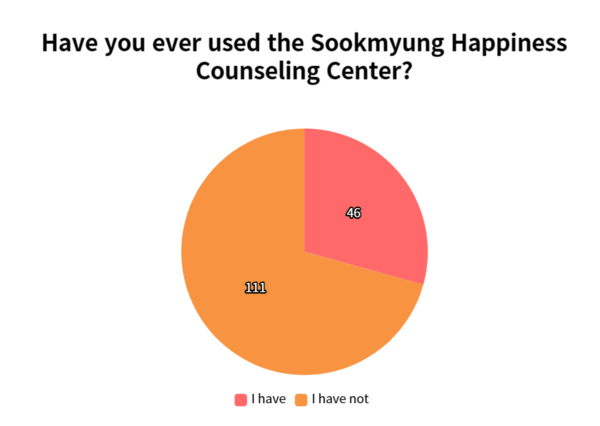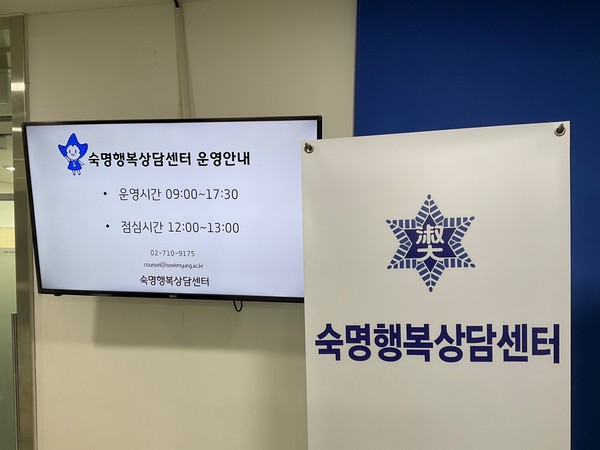
Noonsong, who is interested in MBTI, wanted to get a specialized MBTI test and heard that the Student Counseling Center provides such tests for students. When searching the website of the center, she saw that it offers not only the basic counseling programs but also the various comprehensive psychological tests and programs. After learning about them, she decided to experience those programs through the center.
A place for student welfare
Sookmyung Women's University operates the Student Counseling Center as a space where students can share their concerns. It is located on the first floor of the Queen Sunheon Building and is open from 9 a.m. to 5:30 p.m. It not only helps students understand their personalities and aptitudes through various counseling but also provides help when students are in emergency situations. There are three main types of counseling offered. First, personal counseling can be received through 1:1 meetings with professional counselors. Various topics for counseling are covered such as academic, career, life, and family. Each consultation takes 50 minutes and is run for 12 sessions. Next, the psychological test is conducted to get necessary psychological information first, helping set counseling goals according to individual conditions. The center provides various psychological tests such as a career aptitude test, comprehensive psychological test, and character test. As a tool for understanding an individual's mental state, students can check their results through counseling with professionals. In addition, group counseling is a growth program in which several students with similar concerns share their stories with each other under guidance to better understand others as well as themselves. As for it, programs on topics such as stress reduction group counseling through meditation and MBTI group counseling are offered. In this way, students can receive counseling by selecting a method that suits them.
The Student Counseling Center also conducts various programs for students in addition to counseling. In March, the program "Time to Get Friendly with Me, ME Time in SMWU" was held. It was divided into student participatory classes, lectures, and pop-up spaces. Students' direct participation in the class was promoted through the "Oseolok Five Senses Walk," which is a tea class that allows them to gain peace of mind, and "Dream Board Making,'' which focuses on their dream future. In the lectures, guest speakers such as singer-songwriter Stella Jang were invited, and students had the opportunity to hear their stories and share their thoughts with them. In the pop-up spaces, students were able to explore their emotions and share their concerns through two booths: the Garden of Emotion and the Garden of Concern. Through these booths, students empathized and shared their feelings expressed by 68 cards and their worries by MBTI type. In May, the "Happiness and Growth Workshop - Mind Pharmacy" program was held. For two days, the booth in Queen Sunheon Square offered a chance to pursue individual happiness and identify stress factors for students through a happiness zone and stress zone. After participating, students could get snacks and confidence stickers as a "prescription for mind care kits." As such, students can improve their basic personal quality of life that affects school life by using the center for free at any time.

The previous program posters of the Student Counseling Center
Barriers to delivery of happiness
SMT surveyed students to find out more about their perception of using the Student Counseling Center. Multiple responses were allowed to the questions about reasons for not using the center, purpose of use, and reasons for satisfaction and dissatisfaction with the center. According to the survey, 111 out of 157 (70.7%) said they had never used the Student Counseling Center.1) In this regard, 63 out of 111 (56.8%) said they had not used it because they did not know exactly what counseling it provides, 39 out of 111 (35.1%) said they had not used it because they did not know about its existence, and 34 out of 111 (30.6%) said they didn't feel the need to use it. It seems that while some students have not been using the center voluntarily, others were not aware of the benefits available through them, which may have contributed to the low usage rate. Regarding the awareness of what services, campaigns, and lectures are conducted as well as counseling, 82 out of 157 (52.2%) said they did not know, and 75 out of 157 (47.8%) said they did. When asked if they had participated in any center-related programs, 58 out of 89 (65.2%) said they had not, while 31 out of 89 (34.8%) said they had. The fact that over half of the respondents did not know about the programs shows that more active publicity needs to be made by the center to improve the low utilization rate. 22 out of 31 (71%) of the students who said they had participated in the programs said they were very satisfied with their experience, while 9 out of 31 (29%) said they were generally satisfied. This reveals that programs are appealing to students and could be in high demand in the future. As such, students who have used the program are satisfied, but the lack of publicity prevents many from experiencing it.
Of the 157 respondents surveyed, 46 (29.3%) said they had used the Student Counseling Center. 37 out of 46 (80.4%) said they took a professional psychological test, and 22 out of 46 (47.8%) said it was to get counseling due to their personal concerns. Next, 10 out of 46 (21.7%) received counseling about their careers, and 7 out of 46 (15.2%) received counseling about their studies. SMT asked them how satisfied they were with the counseling at the center. Of the 46 students who had used it, 29 (63%) said they were generally satisfied, and 14 (30.4%) said they were very satisfied. As for the reasons, 37 out of 42 (88.1%) said they were satisfied because they could receive counseling and psychological tests for free. Also, 24 out of 42 (57.1%) said they could access it more easily than going to an external institution, and 18 out of 42 (42.9%) said it had helped solve their problems. On the other hand, 3 out of 46 (6.5%) students who had used it, said they were generally dissatisfied. Among the reasons, 4 out of 6 (66.7%) said that the counselor's counseling method was inappropriate, and 3 out of 6 (50%) said that the waiting time for counseling was too long. This implies that each individual experiences a varying quality of counseling and that there is a waiting time. SMT also asked students how long it took to get counseling after the initial application. The responses ranged from one week to more than three months, of which 5 out of 22 (22.7%) said less than two weeks, 5 out of 22 (22.7%) said less than four weeks, 3 out of 22 (13.6%) said less than two months, 1 out of 22 (4.5%) said less than three months, and 2 out of 22 (9.1%) said more than three months. This indicates that the waiting time for counseling is not consistent, and some students are inconvenienced by this. It seems that additional efforts by the center are needed to ease the inconvenience experienced by students.


The possibilities for better consultation
Based on these survey results, SMT interviewed a representative of the Student Counseling Center. At first, SMT asked about the waiting time for counseling which ranged from one week to more than three months from person to person. The head of the center, Lee Yu-kyung, explained the difficulties in solving such an irregular waiting time in terms of a budgetary problem. She said that they need to increase the number of counselors to decrease the waiting time when the demand is more than supply, but it requires more financial assistance from the school. Another issue that she has revealed was the adjustment of schedule. There can be some troubles in the process of arranging the schedule between the students' free time and the counselors' available time. Moreover, she explained that the length of the consultation process seems to be one of the factors in a long waiting time for others. The consultation process starts with the application receipt, then a simple psychological test and interpretation, next an analysis of the level of counseling depending on the degree of urgency, and finally connecting to a counselor. In consideration of the number of counseling sessions per person, which is 12, this whole process of consultation can make the waiting time longer as new applicants must wait. To improve this problem, the center has tried hard to increase the number of counselors over the past three years within budget limitations to immediately meet student demand. The head of the center said that they will try to solve the problem in this way. Therefore, it seems that the primary factor of waiting time is related to the number of counselors.
Then, she also received the results of a survey about the number of users. According to the survey, it showed a high level of satisfaction among the center's users and program participants, but also a high number of respondents who had never used the center. Moreover, Kim Soo-yeon, a student in the Division of Business Administration '22, said, "I have never used the center and do not know what kind of counseling the center is providing to students now actually. It would be great if they actively promote their programs to students." Based on this student opinion and the survey, the SMT reporter also asked if the center felt the need for more publicity. The center said that they use the school's promotion system as much as possible such as Heyoung Campus, SnoWe, and Everytime. Therefore, after seeing the necessity for change in the promotion method, the center is trying to improve the operation of the website later this year, and they believe that it can help to solve this problem. The head of the center gave her opinion frankly about the number of users. "In the case of programs that are useful to students, more promotion is necessary of course. Our hope is not that every student uses our center, but that we provide the right programs for the right students." The center said they will try to make some changes in their promotion, but the director also revealed her subjective opinion that increasing the number of users will not simply lead to the happiness of all students. As a result, it seems that there are possibilities for better promotion, as long as it can contribute to the well-being of more students.

For smoother and more publicized service
The Student Counseling Center is a facility that is helping students who need psychological support. Currently, it is providing mostly high satisfaction with its various programs. However, there are some barriers such as a wide range of counseling waiting time from student to student and a need for program awareness. Therefore, it seems that additional practical and effective measures are needed at the center for residual problems for the greater happiness of Sookmyungians.
1) The total number of students enrolled is 12,231, with a survey participation rate of about 1.3%.
Kim Park Yeonhoo / Reporter
smt.kpyh@gmail.com
Lee Park Jeongeun / Reporter
smt.lpje@gmail.com


